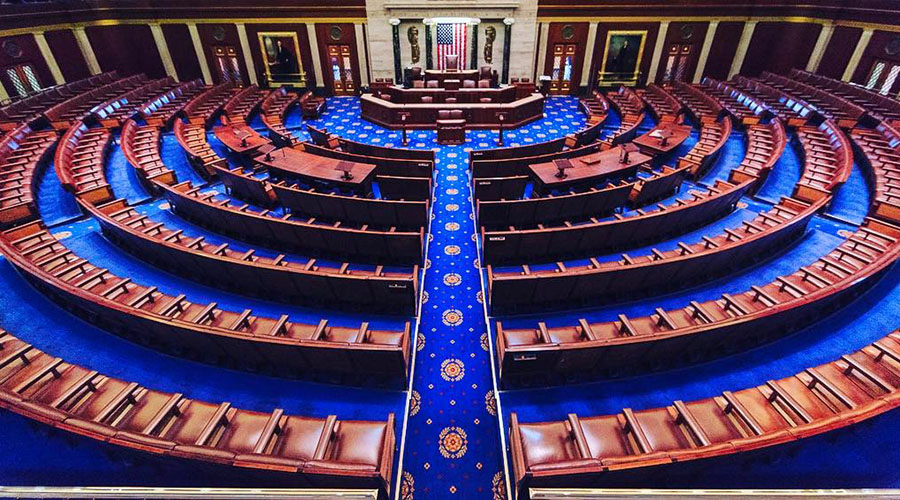By Mitch Ambrose | March 16, 2023

Credit: Office of the Speaker of the House
The House of Representatives chamber.
Following the 2022 election, which handed control of the House of Representatives to Republicans after four years of control by Democrats, Congress has made significant changes in the leadership of key committees that draft budgets and policy for science agencies.
While House Democrats have not changed the top members of appropriations subcommittees that write legislation that funds science agencies, House Republicans have reshuffled their leaders.
For instance, the House’s Energy-Water Subcommittee, which has jurisdiction over the Department of Energy (DOE), is now chaired by Rep. Chuck Fleishmann (R-TN), a vocal supporter of national laboratories whose district includes DOE’s Oak Ridge National Lab. The top Republican previously was Rep. Mike Simpson (R-ID), who is still a subcommittee member but now chairs a separate panel with jurisdiction over the U.S. Geological Survey and Environmental Protection Agency. Rep. Marcy Kaptur (D-OH) returns as the top Democrat on the subcommittee.
The Commerce-Justice-Science Subcommittee, which covers NASA, the National Science Foundation (NSF), and the National Institute of Standards and Technology (NIST), is now chaired by Rep. Hal Rogers (R-KY), the longest-serving member of the House. The top Republican in the prior Congress was Rep. Robert Aderholt (R-AL), who departed the role to lead a different panel but will retain a seat on the subcommittee. Rep. Matt Cartwright (D-PA) remains the top Democrat on the subcommittee.
Beyond the House appropriations committees, among the most significant leadership changes is that Rep. Frank Lucas (R-OK) is now chairing the House Science, Space, and Technology Committee, which oversees most civilian research agencies outside the biomedical sphere. Lucas has pledged to maintain the bipartisan character of the committee that existed under Rep. Eddie Bernice Johnson (D-TX), who chaired it from 2018 until she retired at the end of last year.
Lucas will oversee implementation of the CHIPS and Science Act, especially its $52 billion in subsidies for semiconductor manufacturing and R&D. He also plans to focus on competition with China, holding the committee’s first hearing of the year on the topic.
“The Chinese Communist Party is determined to overtake us as the global leader in science and technology,” Lucas remarked during the hearing’s opening. “They’re outspending us, out-publishing us, and out-educating us when it comes to STEM PhD graduates.”
Lucas was one of the primary Republican authors of the science provisions of the CHIPS and Science Act, which proposes that Congress rapidly ramp up NSF, DOE, and NIST budgets. However, House Republican leaders have pledged to constrain federal spending overall, which could make it difficult for the appropriations subcommittees to meet the CHIPS Act’s spending targets.
Rep. Zoe Lofgren (D-CA) has taken Johnson’s spot on the committee and has identified fusion energy research as her top priority. Pointing to the recent breakthrough fusion experiment at DOE’s National Ignition Facility, located near her district, Lofgren stated at the committee’s first hearing, “I think a Manhattan Project level of commitment is needed now to ensure that the incredible promise of fusion energy is achieved.”
On the Senate side, leadership changes on the Appropriations Committee were driven by the retirements of its top two members: Sens. Patrick Leahy (D-VT) and Richard Shelby (R-AL). The committee is now chaired by Sen. Patty Murray (D-WA); the top Republican is Sen. Susan Collins (R-ME). The Senate’s Commerce-Justice Science Subcommittee will again be led by Sens. Jeanne Shaheen (D-NH) and Jerry Moran (R-KS), and its Energy-Water Subcommittee will again be led by Sens. Dianne Feinstein (D-CA) and John Kennedy (R-LA).
Mitch Ambrose is Director of FYI. Published by the American Institute of Physics since 1989, FYI is a trusted source of science policy news. Sign up for free emails at aip.org/fyi.
©1995 - 2024, AMERICAN PHYSICAL SOCIETY
APS encourages the redistribution of the materials included in this newspaper provided that attribution to the source is noted and the materials are not truncated or changed.
Editor: Taryn MacKinney
April 2023 (Volume 32, Number 4)
Articles in this Issue

